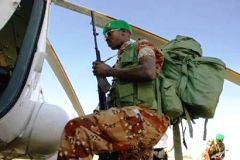African Union troops battle shortages in Darfur
By Finbarr O’Reilly
EL FASHER, Sudan, Nov 7 (Reuters) – The African Union mission in Darfur faced critical transportation and supply shortages as it began sending reinforcements into remote parts of western Sudan on Saturday, a senior official said.

|
|
Rwandan African Union troops board a helicopter in El Fasher in North Darfur on November 5, 2004. (Reuters). |
“We need a lot more people, but we also need the logistics to move and feed them or it will mean nothing,” said Colonel Anthony Amedoh, the mission’s chief military observer.
“At the moment, we don’t have enough vehicles for transporting the expanded force,” he told Reuters during an interview in el Fasher, the capital of North Darfur state.
The African Union (AU) voted last month to boost its force in Darfur from about 440 soldiers up to 3,320 personnel, including 2,341 troops and 815 civilian police tasked with monitoring a shaky ceasefire in Africa’s largest country.
Planes and helicopters carried 228 Rwandan and Nigerian troops from the AU headquarters in el Fasher to Kebkabiya and Geneina in western Darfur on Saturday, delivering the mission’s first reinforcements into the field.
The objective of the AU mission is to help improve security for civilians and aid workers operating in a vast arid region where fighting has driven more than 1.6 million people from their homes during the past 20 months.
Darfur’s conflict erupted in early 2003 when rebels launched a revolt against Sudan’s government, accusing it of neglecting the region.
Arab militias known as Janjaweed, who rebels say have government backing, responded by attacking villages and embarking on a wave of looting, raping and killing. Khartoum calls the Janjaweed outlaws.
CONFIDENCE PATROLS
The expanded AU mission, which is seen as a test of the African Union’s ability to solve the continent’s problems, is expected to cost $220 million, with most financing coming from donors, including the European Union.
Only 275 reinforcements from Nigeria and Rwanda have landed in el Fasher so far however, and the rest are expected to take another four months to arrive as the security situation in Darfur steadily deteriorates.
Aid agencies fearing a surge of fighting have suspended operations and evacuated staff from the volatile Jebel Marra area in West Darfur state, leaving about 160,000 displaced villagers without the essential food handouts they rely upon.
“Ideally, we should deploy troops into that area and we are willing, but we don’t have the equipment such as tents, food, water and vehicles to put forces there yet,” Amedoh said.
The mission was sending patrols into the mountainous area to try to negotiate safe passage for aid groups, he added.
Despite the obstacles on the ground, Amedoh said the AU troops have had some success in boosting security through “confidence patrols” and intervening to prevent the forced removal of people from camps by government officials.
“We are making progress, but slowly,” he said.
